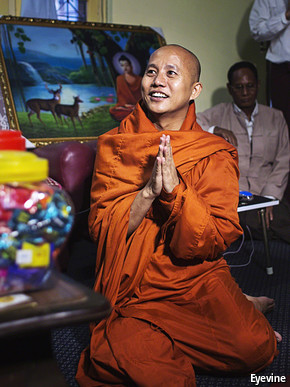From The Economist

Fuelled by a dangerous brew of faith, ethnicity and politics, a tit-for-tat conflict is escalating between two of Asia’s biggest religions
THE total segregation of Buddhist Arakanese from Muslim Rohingyas is now a fact of life in the western Myanmar port-city of Sittwe. Until June last year both communities lived side by side in the capital of Rakhine state, but following several rounds of frenzied violence, the Buddhist majority emptied the city of its Muslim population. The Rohingya victims now scrape by in squalid refugee camps beyond the city boundaries. The best that most of them can hope for is to escape on an overloaded fishing boat to Malaysia. Many of them die trying.
The animosity between the Rohingya and the local Arakanese in this remote corner of Myanmar is a consequence of colonial and pre-colonial patterns of settlement. It is an old and very local affair, and there were hopes that it would stay that way. Not any more. The assault on the Rohingyas, which cost more than 100 lives and made over 100,000 homeless, sparked a wildfire of sectarian violence across the rest of Myanmar which now seems to be spreading to other parts of Asia, too. A tit-for-tat escalation is going on which, with reason, worries many in the region.
While the actual bloodletting in Myanmar has abated, at least for now, no let-up has taken place in the hateful rhetoric directed against the country’s Muslim minority, which makes up about 5% of the 60m population. Radical monks, led by a notorious chauvinist, Wirathu, from a monastery in the northern city of Mandalay, have abandoned any claims to Buddhism as a universal doctrine of compassion and non-violence. For them Buddhism equates with a narrow nationalism. They argue, quite simply, that unless the majority-Buddhist population fights back, Muslims, with alarmingly high birth rates, will overrun the country. On July 22nd he claimed that a small explosion in a car near where he was preaching was the work of Islamic extremists. It all taps into old resentments against the big influx of Indians, many of them Muslim, who came into the country on the coat-tails of British colonialists during the 19th and early 20th centuries. They ran much of the country’s finance and commerce, and were hated for it by the indigenous Burmans. Race riots against Indians and Muslims in the 1930s in Yangon (then Rangoon, the capital) and elsewhere were whipped up then, as now, by a chauvinist Buddhist press.






